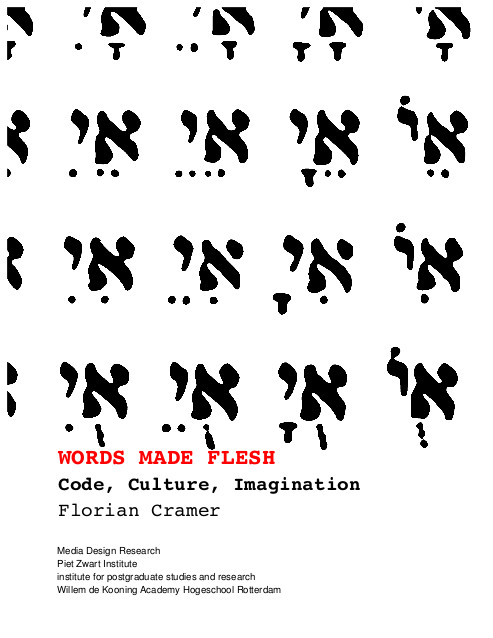Jacques Derrida, Bernard Stiegler: Echographies of Television: Filmed Interviews (1996/2002)
Filed under book | Tags: · literature, mass media, media studies, philosophy, photography, recording, sociology, technology, teletechnologies, television

“In this book, Jacques Derrida talks with Bernard Stiegler about the effect of teletechnologies on our philosophical and political moment. Improvising before a camera, the two philosophers are confronted by the very technologies they discuss and so are forced to address all the more directly the urgent questions that they raise. What does it mean to speak of the present in a situation of “live” recording? How can we respond, responsibly, to a question when we know that the so-called “natural” conditions of expression, discussion, reflection, and deliberation have been breached?
As Derrida and Stiegler discuss the role of teletechnologies in modern society, the political implications of Derrida’s thought become apparent. Drawing on recent events in Europe, Derrida and Stiegler explore the impact of television and the internet on our understanding of the state, its borders and citizenship. Their discussion examines the relationship between the juridical and the technical, and it shows how new technologies for manipulating and transmitting images have influenced our notions of democracy, history and the body. The book opens with a shorter interview with Derrida on the news media, and closes with a provocative essay by Stiegler on the epistemology of digital photography.”
First published as Echographies de la télévision – Entretiens filmés, Galilée, Paris, 1996.
Translated by Jennifer Bajorek
Publisher Polity Press, 2002
ISBN 0745620361, 9780745620367
174 pages
PDF (no OCR; updated on 2012-7-19)
Comment (0)Garin Dowd: Abstract Machines: Samuel Beckett and Philosophy after Deleuze and Guattari (2007)
Filed under book | Tags: · abstract machine, immanence, literature, phenomenology, philosophy

Abstract Machines: Samuel Beckett and Philosophy after Deleuze and Guattari is an innovative approach to the relationship of the work of Samuel Beckett to philosophy. The study seeks to combine intertextual analysis and a ‘schizoanalytic genealogy’ derived from the thought of Gilles Deleuze and Flix Guattari to explore a ‘becoming-philosophy’ of Beckett’s literary writing. The author focuses on zones of encounter and confrontation – spaces and times of ‘becoming’ – between Beckett, selected philosophers and Deleuze and Guattari. In the retrospective glance occasioned by that part of Deleuze and Guattari’s complex legacy which embraces their interest in the author, Beckett’s writing in particular effectuates a threshold hesitation which can be seen directly to impact on their approach to the history of philosophy and on their contribution to its ‘molecularization’ in the name of experimentation. “Abstract Machines,” with its arresting perspectives on a wide range of Beckett’s work, will appeal to academics and postgraduate students interested in the philosophical echoes so evident in his writing. The extent of its recourse to philosophers aside from Deleuze and Guattari, including, notably, Alain Badiou, renders it a timely and provocative intervention in contemporary debates concerning the relationship of literature to philosophy, both within Beckett studies and beyond.
Publisher Rodopi, Amsterdam/New York, 2007
ISBN 904202206X, 9789042022065
319 pages
Keywords and phrases
Leibniz, abstract machine, Worstward Ho, plane of immanence, Samuel Beckett, monad, Mille Plateaux, body without organs, Plotinus, Gilles Deleuze, Alain Badiou, deterritorialization, Spinoza, Malone Dies, schizoanalysis, phenomenology, Monadology, negative theology, Mengue, Deleuze and Guattari
PDF (updated on 2013-2-7)
Comments (2)Florian Cramer: Words Made Flesh: Code, Culture, Imagination (2005)
Filed under book | Tags: · art, art history, code, code poetry, computation, experimental literature, kabbalah, language, literature, philosophy, poetry, religion, software, software art, technology

“Executable code existed centuries before the invention of the computer in magic, Kabbalah, musical composition and experimental poetry. These practices are often neglected as a historical pretext of contemporary software culture and electronic arts. Above all, they link computations to a vast speculative imagination that encompasses art, language, technology, philosophy and religion. These speculations in turn inscribe themselves into the technology. Since even the most simple formalism requires symbols with which it can be expressed, and symbols have cultural connotations, any code is loaded with meaning. This booklet writes a small cultural history of imaginative computation, reconstructing both the obsessive persistence and contradictory mutations of the phantasm that symbols turn physical, and words are made flesh.”
Editor: Matthew Fuller, additional corrections: T. Peal
Published within Media Design Research programme, Piet Zwart Institute, Willem de Kooning Academy Hogeschool, Rotterdam
GNU General Public License 2; GNU Free Documentation License 1.2; Creative Commons Attribution-ShareAlike License 2.0
141 pages
Review: Tomáš Javůrek (Joinme, 2018, CZ).
PDF (updated on 2012-10-11)
HTML (added on 2013-7-1)
Sequel: Exe.cut(up)able statements: Poetische Kalküle und Phantasmen des selbstausführenden Texts (2011, in German).
Comment (0)
